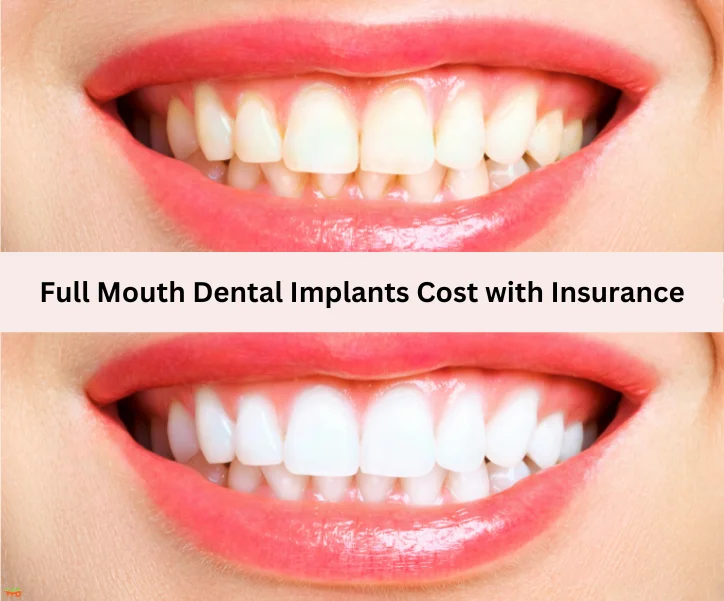
When it comes to restoring your smile and improving your oral health, full mouth dental implants are one of the most comprehensive and long-lasting solutions. However, understanding the full mouth dental implants cost with insurance can be tricky. Whether you’re considering implants due to extensive tooth loss, decay, or injury, the financial aspect of this procedure plays a significant role in your decision-making process.
In this guide, we will explore the factors that affect the full mouth dental implants cost with insurance, what you can expect from your coverage, and how to make this life-changing procedure more affordable.
What Are Full Mouth Dental Implants?
Full mouth dental implants involve replacing all of your upper and lower teeth with artificial ones that are anchored directly into your jawbone. This process provides a stable, durable, and natural-looking solution that improves both your functionality and aesthetics. Unlike traditional dentures, which can slip and cause discomfort, dental implants are permanent, offering a more reliable alternative.
The procedure for full mouth implants typically involves several stages:
- Initial consultation and planning: Your dentist will assess your oral health and determine if you’re a good candidate for implants.
- Placement of dental implants: Titanium posts are surgically placed into your jawbone to act as the roots for your new teeth.
- Healing and bone integration: The implants need time to fuse with your bone, which can take several months.
- Placement of prosthetic teeth: After the implants have fully integrated, your permanent set of artificial teeth is placed.
But, as with any dental procedure, the cost of full mouth dental implants can be overwhelming for many patients. Fortunately, dental insurance can help reduce the financial burden. Let’s dive deeper into understanding full mouth dental implants cost with insurance.
How Much Do Full Mouth Dental Implants Cost with Insurance?

The full mouth dental implants cost with insurance can vary widely based on several factors. Typically, the cost can range from $24,000 to $100,000 or more, depending on your location, the number of implants required, and the type of materials used. The high price tag reflects the complexity of the procedure and the need for skilled dental professionals to ensure the best results.
Among those variables that affect the price are:
1. Number of Implants Required
For full mouth implants, the number of implants needed can vary. Some patients might require 4-6 implants per arch, while others may need more. The greater the number of implants, the more expensive the treatment will be.”
2. Type of Implants Used
There are different types of implants available, such as traditional implants and mini implants. Mini implants tend to be less expensive but may not be suitable for all patients. Full-size implants, while more costly, tend to offer greater stability and longevity.
3. Complexity of the Procedure
If you have underlying health conditions or require bone grafting to ensure your jawbone is strong enough to support the implants, the cost will increase. Bone grafting involves adding bone material to areas of the jaw that have been compromised, adding both time and expense to the procedure.
4. Geographical Location
The cost of full mouth dental implants can also vary by region. Urban areas with high demand for dental services might have higher prices compared to rural areas.
Does Insurance Cover Full Mouth Dental Implants Cost with Insurance?
One of the most common questions about full mouth dental implants cost with insurance is whether dental insurance covers the procedure. The short answer is: it depends.
Dental Insurance Coverage
Traditional dental insurance plans typically cover a percentage of the cost for basic procedures, such as cleanings, fillings, and crowns. However, dental implants are often considered a more advanced procedure, and many standard insurance plans do not cover the full cost of implants.
Some dental insurance policies may offer partial coverage for implants, but this is usually limited. For example, insurance might cover the cost of the consultation, some preliminary procedures, or the crown, but not the implants themselves.
Medical Insurance Coverage
While dental insurance may not cover the full mouth implant procedure, your medical insurance may be a different story. If you have missing teeth due to an accident, injury, or medical condition, your medical insurance may help cover part of the costs. It’s important to check with your insurance provider to determine if your situation qualifies for coverage.
Implant Insurance Riders
Some insurance companies offer specialized coverage riders for dental implants. These riders can be added to your policy for an additional fee and might cover a portion of the cost for full mouth dental implants.
Maximizing FSAs and HSAs for Dental Implant Savings
If your insurance doesn’t cover the full mouth dental implants cost, you can use an FSA or HSA to pay for the procedure with pre-tax dollars. These accounts allow you to set aside money for medical expenses, making dental implants more affordable.
Steps to Maximize Insurance Benefits for Full Mouth Dental Implants Cost with Insurance

Although the full mouth dental implants cost with insurance might not be fully covered, there are still ways to reduce out-of-pocket expenses. Here’s a step-by-step guide to help you navigate your insurance coverage:
Step 1: Check Your Insurance Policy
Start by reviewing your dental and medical insurance policies. Look for details on coverage for dental implants and related procedures. If you’re unsure, contact your insurance provider directly to ask about their policies on dental implants.
Step 2: Obtain a Pre-Authorization
Before starting the procedure, ask your dentist to submit a pre-authorization request to your insurance company. This will give you an estimate of what your insurance will cover, and help you plan for the remaining costs.
Step 3: Inquire About Coverage for Related Procedures
Your insurance may not cover the implants themselves, but it could cover related procedures, such as bone grafting, sinus lifts, or consultations. By understanding which parts of the procedure are covered, you can save money on the overall treatment.
Step 4: Consider Financing Options
If your insurance doesn’t cover enough of the cost, many dental offices offer financing options. Payment plans can help break down the overall cost of full mouth dental implants into manageable monthly payments.
Step 5: Look for Discount Programs
Some dental practices offer discount programs for uninsured patients or for those who pay upfront. Be sure to inquire about any available discounts to lower your overall costs.
How to Afford Full Mouth Dental Implants
If you don’t have comprehensive dental insurance, there are other financing options available to make full mouth dental implants more affordable.
1. Dental Payment Plans
Many dentists offer flexible payment plans that allow you to spread the cost of your treatment over time. These plans can be interest-free or low-interest, depending on the dentist’s terms.
2. Personal Loans
Taking out a personal loan is another option to finance dental implants. These loans typically offer a fixed interest rate, and you can pay them back in installments.
3. CareCredit
CareCredit is a healthcare financing option specifically designed to help pay for medical and dental procedures. Many dental offices accept CareCredit, and it can be used to cover the cost of full mouth dental implants.
4. Insurance-Linked Financing
Some dental insurance providers also offer financing options for procedures that aren’t fully covered. Be sure to ask your insurer about any such programs.
Conclusion: Full Mouth Dental Implants Cost with Insurance – Is It Worth It?
Investing in full mouth dental implants cost with insurance can seem daunting at first, but it’s important to consider the long-term benefits. Full mouth implants restore not only the appearance of your smile but also the function of your teeth, allowing you to eat, speak, and smile confidently.
By understanding how insurance works and exploring financing options, you can make full mouth dental implants more affordable. If you’re ready to take the next step, speak with your dentist to get a personalized cost estimate and find out how you can best utilize your insurance benefits to cover the procedure.
With the right plan in place, full mouth dental implants can be an excellent investment in your health and well-being. Don’t let cost hold you back from achieving the smile you deserve!